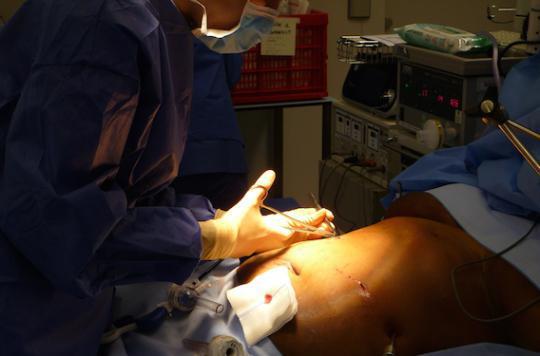Two years after weight loss surgery, one in two patients is lost to follow-up. To solve the problem, a group proposes to improve the training of doctors and patients.

These are not the twelve labors of Hercules, but the task is arduous. The National Collective of Obese Associations (CNAO) presented a White Book on the follow-up of bariatric surgery. He reminds us that post-operative follow-up remains the “Achilles heel” of care. Twelve proposals are made to improve the balance sheet. Because two years after his operation, one in two patients is lost to follow-up.
From patient to pharmacist
The lack of follow-up of those operated on is all the more problematic as bariatric surgery is experiencing a real boom. 50,000 people are operated on each year. The intervention is not trivial, and requires lifelong care. Changes in the absorption of food cause deficiencies, which requires the intake of nutritional supplements. But late complications can also occur, especially neurologically.
The CNAO is well aware of these risks and wishes to reduce them as much as possible. The 12 proposals made in the White Paper should allow this if they are implemented. They concern all those involved in bariatric surgery, from the patient to the pharmacist, including the multidisciplinary team.
Self-service consultation
The first step, believes the Collective, is to bring together all the stages of monitoring in one place. In other words, facilitate the patient’s journey. To do this, he proposes the creation of obesity centers which bring together the skills of obesity specialists, whether they are surgeons, nurses, nutritionists or psychologists. But not under any conditions: these houses must be submitted to a label, itself dependent on specifications. If this is not respected, the label may be withdrawn.
Why not offer a “self-service” nursing consultation, adds the White Paper. It would make it possible to answer patients’ questions.

A qualitative study
50,000 people operated on does not necessarily mean 50,000 people operated on in the same way. The CNAO suggests launching a qualitative and quantitative study with 425 establishments. The objective: to carry out an inventory of the practice in the country, in order to harmonize the practices in accordance with the recommendations of the High Authority of Health.
Still with a view to improving practice, the Collective is asking to strengthen the pharmacist’s advisory role in the field of nutritional supplements. But the patient must also be more involved, and his follow-up facilitated by the establishment of a one-year schedule, of a notebook which takes stock of the follow-up between the various stakeholders. The White Paper also suggests that health professionals be better trained.
Train patients
It’s not just doctors who need training. The patients too. The CNAO advocates for better therapeutic education. Strengthening psychological preparation, empowering the patient by signing a care contract, strengthening information through brochures and quizzes: these are all measures that should improve the results for obese people who are about to suffer bariatric surgery. The success of the operation also requires a “deconditioning”, adds the White Paper, which positions itself in favor of nutritional rehabilitation and the reintroduction of physical activity into the way of life even before the intervention.
The last two measures are not the least: the CNAO wants non-medical monitoring of the patient to be made possible, which would facilitate long-term care, and that communication be made less anxiety-provoking.
The Collective also cites the example of the Netherlands model, where patients must be followed for 5 years by a multidisciplinary team. During this period, the costs are fully covered by the community and private insurance. Then, the general practitioner plays the role of coordinator.
.















